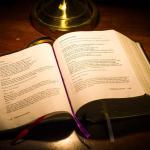
Bill Wilson was an alcoholic stock broker whose drinking landed him in Towns Hospital in New York City in 1935, where he was treated for alcoholism. During his hospitalization he had a spiritual awakening in which God revealed himself [sic] to Bill and illuminated his path to recovery.
Alcoholics Anonymous (AA) was co-founded in May, 1935 by Bill Wilson, commonly referred to as Bill W. in accordance with the “anonymous” in the title of the fellowship, and by Dr. Robert Smith, commonly referred to as Dr. Bob, a rectal surgeon living in Akron, Ohio. When they met, they were both struggling to stay sober, and came to believe that the only way to do so was to trust in a Higher Power and to carry the message of hope and recovery to still suffering alcoholics.
The structure and philosophy of AA grew out of the Oxford Group, of which some of the original members of AA, including Bill and Bob, were affiliated. Much of society and especially, perhaps, religion at the time, considered alcoholism a sin or simply weak willpower. The Oxford Group, however, considered alcoholism to be an allergy, a sickness over which the alcoholic had no control.
The Oxford Group was first known as the First Century Christian Fellowship. It was founded in 1921 by Frank N. D. Buchman, an ordained Lutheran minister who referred to himself as a “soul surgeon.” Oxford Group members were not expected to leave their churches, but to supplement their attendance at church with the Oxford Group, which was inner-focused, non-denominational, and adhered to no specific theology. Their only purpose was to guide people into leading a more Christian and moral life.
The Oxford Group’s formula for self-improvement was to surrender your life to God, admitting that you could no longer run your life by yourself, to be honest about yourself, to make amends where possible, to be of service to others without asking for anything in return, and to pray. The Oxford Group dedicated themselves to the Four Absolutes: absolute honesty, absolute purity, absolute unselfishness, and absolute love.
Bill W., Dr. Bob, and the fellowship of Alcoholics Anonymous were also influenced by other organizations, groups, individuals, and religious orders dating back to the 1700’s. Many people believe that AA most closely resembled a nineteenth-century religious group called the Washingtonians. A major influence on Bill W. was a book written by William James, The Varieties of Religious Experience. All the groups that influenced AA had at least one thing in common: the idea of having a personalized religious movement that was not dependent on the creed, law, or doctrine of organized religion.
But it was the Oxford Group that gave the alcoholics in Akron and New York their philosophical home and their spiritual focus. Eventually, for a variety of reasons, Bill W. and Dr. Bob began to feel that they needed their own group to deal exclusively with alcoholics. One such reason is that the Oxford Group’s success, and Rev. Buchman’s interest in the rich and powerful, caused the Oxford Group to attract exclusive members. Alcoholics, on the other hand, often came from the bowels of society. Dis-ease was building between the church and the fellowship. Like the first century Jewish followers of Jesus and Judaism that drifted apart (as mentioned in the previous blog post) ~ AA stepped-out on its own.
Using Oxford Group principles and a belief in the disease concept of alcoholism; Bill Wilson and Dr. Bob teamed up to spread the good news of AA to still suffering alcoholics. At first, the sober alcoholic “evangelists” demanded that AA prospects get down on their knees to pray aloud and claim that they were willing to turn their life over to the care of God. But it didn’t take long to realize a shortage of “converts” to AA using those tactics. Bill’s physician, Dr. Silkworth, told Bill to back off on the religious stuff and start telling alcoholics the simple message that they were ill; not evil, not crazy, not weak.
Bill W. wrote the Twelve Steps sitting up in bed one night next to his wife. Some members of the New York and Akron groups thought that there was too much God in the steps and in Alcoholics Anonymous, the basic text also known as The Big Book. They thought all the God-talk would offend potential agnostic and atheist members, as well as those who were turned-off by earlier experiences with religious institutions. The concept of claiming a relationship with a “Higher Power” or “God, as we understand Him” came to replace, in many instances, use of the word “God.” But it in no way abandoned the belief that, for alcoholics, only a power greater than themselves could restore them “to sanity.”
Initial reactions to the Big Book were mixed. An October 14, 1939, review in the Journal of the American Medical Association called the book, Alcoholics Anonymous, “A curious combination of organizing propaganda and religious exhortation.” But in 1940, Harry Emerson Fosdick, Pastor of The Riverside Church in New York City, told a dinner party at the Union Club that was being hosted by John Rockefeller, Jr. and at which Bill W. was invited to speak, “I think that psychologically speaking there is a point of advantage in the approach that is being made in this movement that cannot be duplicated.”
Bill W. and Dr. Bob never formally affiliated themselves with any organized religious group. Dr. Bob even boasted that he had not darkened the doors of a church in forty years, although later in his sobriety he did join the Presbyterian Church and again began reading the Bible. Although Bill W. never joined a church during his years of sobriety, he did take Roman Catholic instruction in the 1940’s from Monsignor Fulton J. Sheen and enjoyed many clergy persons as friends.
Bill W. outlived Dr. Bob by twenty years. Therefore, his tenure and influence as co-founder was far greater. Additionally, Bill W. wrote all the basic texts of AA, and hundreds of articles. In 1951, the Lasker Award of the American Public Health Association was given to AA stating, “Historians may one day recognize AA to have been a great venture in social pioneering which forged a new instrument for social action; a new therapy based on the kinship of common suffering; one having a vast potential for the myriad other ills of mankind.”
It is a major assertion of this series that many of “the myriad other ills of mankind” are manifest in the present-day church and that the principles, philosophies and steps of AA can be applied to the church itself, both institutionally and individually, to be of great benefit to what ails it, whether the members and affiliates of the church are alcoholic or not. People and institutions, as will be “proved” later in this series, exhibit addictive individuals and family systems and symptomology. The same progression of Awareness, Acceptance and Action that has “saved” millions of people in AA can “save” millions of people in the church and, indeed, can save the church itself.
Please ask your friends and colleagues to subscribe to this blog by entering their email address in the upper right corner of this page. Your comments may be incorporation into future posts. Please read the seven posts published prior to this one.















